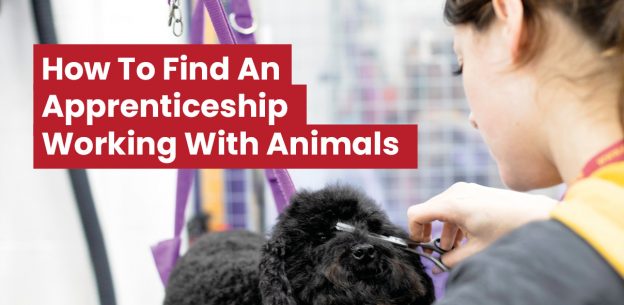If you’re passionate about pursuing a career working with animals, an apprenticeship is an excellent way to gain hands-on experience in your chosen role whilst completing a recognised training programme and getting paid!
In England, apprenticeships require you to live and work in a suitable environment; for those wanting to work with animals this could be in a business such as a boarding kennel, cattery, veterinary practice, dog grooming salon, riding school, or racing yard.
Working in the animal care and veterinary industries is a competitive field, and finding the right apprenticeship can take time. If you’re struggling to secure a role, don’t lose heart. Here are some tips and advice to help you land an animal care apprenticeship:
Search on the Government’s “Find an Apprenticeship” Website
The government’s official “Find an Apprenticeship” website is one of the best places to start your search. Many training providers and employers post their vacancies here. You can search by location, industry, or keyword to find roles that match your interests.
Once you’ve found a vacancy that appeals to you, create an account on the site to apply. Keep checking back regularly, as new opportunities are posted frequently.
Explore Local and National Job Boards
Online job boards often list recent vacancies in animal care and veterinary roles. Some platforms to consider include The College of Anima Welfare Jobs Board, Indeed and Reed. Use keywords such as “animal care apprentice” or “veterinary apprenticeship” to refine your search. Don’t forget to also check local newspapers or community job boards for local opportunities.
Follow Animal Employers and Colleges on Social Media
Social media is a valuable tool for finding apprenticeship opportunities. Many veterinary, animal care and equine employers post their latest vacancies on platforms like Facebook, Instagram, and LinkedIn.
Follow organisations such as The College of Animal Welfare, as well as your other local colleges and training providers that specialise in training for the animal care and veterinary sectors. Staying connected ensures you’re among the first to know when new opportunities become available.
Contact Employers Directly
If you have specific employers in mind, don’t hesitate to reach out to them directly. This proactive approach demonstrates your enthusiasm and commitment, which can make a strong impression.
You can send an email to introduce yourself and express your interest in an apprenticeship, make a phone call to ask if they have any current or upcoming apprenticeship opportunities, or visit in person to hand in your CV directly.
Potential employers to consider include kennels, catteries, veterinary practices, farms, stables, riding schools, animal charities, zoos and wildlife rescue centres. Even if they don’t have immediate openings, they may keep your details on file, offer you a work experience placement or refer you to other opportunities.
Undertake Relevant Work Experience
Gaining work experience in an animal care setting can help you get a foot in the door of the industry, and significantly improve your chances of securing an apprenticeship in the future. Many employers look for candidates who have some hands-on experience, as it shows dedication and a genuine interest in working with animals. Volunteering at an animal rescue centre, assisting at a local stable, or helping out at a veterinary practice can provide valuable skills and insight into the industry.
Work experience can also help you build connections with professionals who may offer guidance, references, or even future apprenticeship opportunities. If you’re struggling to find an apprenticeship straight away, consider gaining work experience first to strengthen your application and increase your chances of success.
Attend Career Events and Open Days
Career events, open days, and job fairs are great opportunities to connect with industry professionals and learn about apprenticeship options. Events like our annual, virtual Careers With Animals Day bring local employers, colleges, and training providers together to discuss career and training options in the animal care professions. You can use these events to ask questions, network with potential employers, and explore pathways in the industry.
Ensure Your CV Is Up to Date
Having a well-prepared CV will help you stand out when applying for apprenticeship vacancies. Include any relevant experience, such as volunteering at an animal shelter or working at a kennel. Highlight any studies or courses related to animal care, such as first aid for animals or pet grooming workshops. If possible, tailor your CV to the specific role you’re applying for, showcasing the skills and experience most relevant to that position.
Animal Apprenticeships at CAW
- Animal Care and Welfare Assistant Level 2 Apprenticeship
- Animal Care and Welfare Manager Level 3 Apprenticeship
- Level 2 Equine Groom Apprenticeship
- Level 3 Senior Equine Groom Apprenticeship
- Level 2 Dog Groomer Apprenticeship
- Veterinary Care Support Level 2 Apprenticeship
- Veterinary Nurse Level 3 Apprenticeship – Companion Animal
- Veterinary Nurse Level 3 Apprenticeship – Equine
Useful Resources
- Gov.uk Find an Apprenticeship: Search and apply for apprenticeships in your area.
- Everything you need to know about animal apprenticeships
- Apprenticeships at CAW
Finding the right apprenticeship may take time, but with persistence and the right approach, you’ll be on your way to a fulfilling career working with animals. Good luck!
Contact us to find out more
If you would like to talk through your options and any concerns/queries, please don’t hesitate to contact our team of Client Advisors. They are here to help and make sure that you choose the apprenticeship that is right for you. You can call us on 01480 422060, email us at admin@caw.ac.uk, start a live chat with us, or request a call back on our website.

